Lansing, Michigan, Hgh State Clinic, Hgh Injections, Hrt Doctors
Lansing, Michigan Blood Testing Facilities
 Represents a LabCorp blood testing facility
Represents a LabCorp blood testing facility Represents a Quest Diagnostics blood testing facility
Represents a Quest Diagnostics blood testing facility

Nearby Labcorp Blood Testing facilities:
- Labcorp Center Distance: 53 m, 1155 E Paris Se Suite 200, Grand Rapids, Kent County, MI, 49546
- Labcorp Center Distance: 62 m, 28595 Orchard Lake Rd Ste 103, Farmington Hills, Oakland County, MI, 48334
- Labcorp Center Distance: 65 m, 20276 Middlebelt Ste 7, Livonia, Wayne County, MI, 48152
- Labcorp Center Distance: 67 m, 2191 S Blvd, Auburn Hills, Oakland County, MI, 48326
- Labcorp Center Distance: 68 m, 2110 16Th Street, Bay City, Bay County, MI, 48708
- Labcorp Center Distance: 73 m, 5250 Auto Club Dr Ste 310A, Dearborn, Wayne County, MI, 48126
- Labcorp Center Distance: 74 m, 1701 South Boulevard E Ste 107, Rochester Hills, Oakland County, MI, 48307
- Labcorp Center Distance: 76 m, 3250 Intertech Dr Ste C, Angola, Steuben County, IN, 46703
- Labcorp Center Distance: 91 m, 1565 S Byrne Rd Ste 105, Toledo, Lucas County, OH, 43614
Nearby Quest Blood Testing facilities:
- Quest Center Distance: 34 m, 300 W Washington Ave, Jackson, Jackson County, MI, 49201-2180
- Quest Center Distance: 42 m, 425 N Fenway Dr, Fenton, Genesee County, MI, 48430-3810
- Quest Center Distance: 43 m, 1397 S Linden Rd, Flint, Genesee County, MI, 48532-4194
- Quest Center Distance: 45 m, G1071 N Ballenger Hwy, Flint, Genesee County, MI, 48504-4453
- Quest Center Distance: 47 m, 6011 Porter Rd, Grand Blanc, Genesee County, MI, 48439-8538
- Quest Center Distance: 50 m, 11515 N Saginaw St, Mount Morris, Genesee County, MI, 48458-2049
- Quest Center Distance: 54 m, 6185 Dixie Hwy, Bridgeport, Saginaw County, MI, 48722-9618
- Quest Center Distance: 55 m, 2062 N Center Rd, Saginaw, Saginaw County, MI, 48603-3716
- Quest Center Distance: 56 m, 5555 Gull Rd, Kalamazoo, Kalamazoo County, MI, 49048-7640
- Quest Center Distance: 57 m, 6620 Highland Rd, Waterford, Oakland County, MI, 48327-1682
- Quest Center Distance: 58 m, 515 Michigan St Ne, Grand Rapids, Kent County, MI, 49503-5721
- Quest Center Distance: 59 m, 4705 Towne Centre Rd, Saginaw, Saginaw County, MI, 48604-2818
- Quest Center Distance: 61 m, 520 N. Mission, Mt. Pleasant, Isabella County, MI, 48858-5003
- Quest Center Distance: 62 m, 4763 Wilson Ave Sw, Grandville, Kent County, MI, 49418-9015
- Quest Center Distance: 63 m, 2050 N Haggerty Rd, Canton, Wayne County, MI, 48187-3796
- Quest Center Distance: 65 m, 11583 Farmington Rd, Livonia, Wayne County, MI, 48150-5729
- Quest Center Distance: 66 m, 1424 S Lapeer Rd, Lake Orion, Oakland County, MI, 48360-1437
- Quest Center Distance: 68 m, 200 S Wenona St, Bay City, Bay County, MI, 48706-8820
- Quest Center Distance: 69 m, 511 Pierce St, Birmingham, Oakland County, MI, 48009-1790
- Quest Center Distance: 71 m, 25070 Michigan Ave, Dearborn, Wayne County, MI, 48124-1740
- Quest Center Distance: 72 m, 135 Barclay Cir, Rochester Hills, Oakland County, MI, 48307-4599
- Quest Center Distance: 75 m, 38815 Dequindre Rd, Troy, Oakland County, MI, 48083-5769
- Quest Center Distance: 79 m, 14720 King Rd, Riverview, Wayne County, MI, 48193-7973
- Quest Center Distance: 80 m, 42500 Hayes Rd, Clinton Township, Macomb County, MI, 48038-6768
- Quest Center Distance: 81 m, 1046 N Monroe St, Monroe, Monroe County, MI, 48162-2936
- Quest Center Distance: 86 m, 201 E. High St, Bryan, Williams County, OH, 43506-0000
- Quest Center Distance: 91 m, 433 Seminole Rd, Muskegon, Muskegon County, MI, 49444-3743
Michigan Hormone Replacement Therapy Services
Are you interested in Hormone Restoration but don't know where to turn? The Conscious Evolution Institute is a fully licensed and insured medical clinic that specializes in the most effective Hormone Replacement Products available on the market today. Our staff of trained health and wellness clinicians and Anti-Aging Doctors can help you uncover any underlying Hormone Imbalances which may be hindering your overall well-being.
By just filling out the form on our website, or giving our clinic a call, we can arrange for you to meet with our vast and experienced network of affiliate medical physicians that can provide the physical and take the blood sample necessary to provide all of the data for our professionals to make an informed diagnosis. If you qualify for therapy, we can have Quality HRT Treatments shipped directly to your door.
Michigan HGH Replacement Services
Human Growth Hormone is one of the most important hormones when it comes to optimal health. HGH is the primary hormone responsible for cellular metabolism, and it plays a role in the peak function of systems all throughout the body. It helps build muscle mass, burn fat, and it helps sustain various systems, including the immune system and the cardiovascular system. Age-Related HGH Deficiency robs the body of this vital hormone, causing the body to slow down, which encourages premature aging and disrupts the healthy function of the body.
Human Growth Hormone Injection Therapy and Sermorelin Injection Therapy are both valid and effective options when it comes to the war against HGH Deficiency. Sermorelin restores hormone balance by optimizing the brain's own production of Growth Hormone, while HGH Therapy directly substitutes for the body's flagging ability to produce its own supply.
Michigan Low-T Treatments
Our clinic also provides treatment for Age-Related Testosterone Deficiency, also known as Andropause. As men grow older, their bodies start to produce smaller and smaller concentrations of Testosterone. There are a number of variables which can speed up the rate of Testosterone Decline, including poor sleeping habits, obesity, and stress. Testosterone Levels start to drop in the late twenties and early thirties, and continue to decline for the rest of your life.
Low-T is a clinical medical condition that occurs once Testosterone Deficiency starts to have a negative impact on your life. The most noticeable symptoms are sexual dysfunction and lack of sex drive, but other symptoms include hypertension, glucose intolerance, hardening of the arteries, anxiety, and trouble sleeping. Testosterone Deficiency is most effectively treated with Testosterone Hormone Replacement Therapy, which is available in many forms, including Testosterone Injections, Gels, Creams, and Dermal Implants.
Michigan HCG Weight Loss Therapy
HCG stands for Human Chorionic Gonadotropin. You may not have ever heard of this hormone, but it is a highly effective weight loss treatment that has helped tens of thousands of men and women across the country diet successfully for the first time in their lives.
For men and women that simply have not found a diet that works for them, HCG Therapy makes dieting easier than ever. HCG has the unique ability to inhibit cravings and soften the impact of hunger. It also encourages the increased metabolism of bodyfat, which sustains energy even when on a low-calorie diet, and wards off fatigue.
If you think you may be a candidate for Weight Loss with HCG, we can help you get treatment!
Major Cities in Michigan
Detroit
Detroit, Michigan is the largest city in the state of Michigan, as well as the largest metropolitan area by far. Detroit is home to a number of professional sports teams, including the NHL Detroit Redwings, the NBA Detroit Pistons, the NFL Detroit Lions, and the MLB Detroit Tigers.
Detroit has faced a significant economic decline over the past forty years, but is slowly recovering, and the suburban communities outside of Detroit, including Auburn Hills, Grosse Point, and Bloomfield Hills remain strong. Museums in Detroit include the Detroit Science Center, the Detroit Historical Museum, and the Detroit Institute of Arts.
Grand Rapids
Grand Rapids is located in the southwestern region of Michigan, and is the second largest city in the state. Grand Rapids also goes by the nickname, the River City, because of its location on the Grand River. Among the largest employers in Grand Rapids are Meijer, Axios Incorporated, and Spectrum Health.
A number of companies are also based in Grand Rapids, including Spartan Stores, Bissell, and Alticor/Amway. The city is widely recognized for its strong economy, and is frequently listed among the best mid-sized cities to live, work, and invest.
Warren
Warren is the most populous suburb of Detroit, and is the third biggest city in the state of Michigan. Historically, Warren was known as Beebe's Corner, and officially became the city of Warren in 1957.
Warren has a strong economy, based largely around its military and automotive presence. Among the companies that are located in Warren are the GM Cadillac Motor Car Division, Tank Automotive Research, and the GM Technical Center. Warren is also the home of Big Boy restaurants.
Sterling Heights
Sterling Heights is another suburb of Detroit, and is located immediately north of Warren, Michigan. Sterling Heights is the fourth biggest city in Michigan. The area began as an agricultural community, selling crops such as rhubarb to the citizens of Detroit, but beginning in the late fifties and early sixties, it quickly became a large suburban community. Sterling Heights is considered one of the safest mid-sized cities in the country.
Lansing
Lansing is located in central Michigan, and is the capital of the state. Michigan State is located in East Lansing, Michigan. Lansing is unique among United States capitals, because it is the only capital which is not considered the county seat (which is Mason, Michigan).
The largest public employers in the area are Michigan State University and the state itself. The largest private employers are General Motors and Sparrow Health System. Lansing has a number of interesting cultural landmarks, including the Lansing Symphony Orchestra, the Riverwalk Theater, and the Impression 5 Science Center.
All About Lansing, Michigan Geographic Area

Lansing ( /ËnlR¦nsɪÅo/) is the capital of the U.S. state of Michigan. It is located mostly in Ingham County, although small portions of the city extend into Eaton County. The 2010 Census places the city's population at 114,297, making it the fifth largest city in Michigan. The population of its Metropolitan Statistical Area (MSA) was 464,036, while the even larger Combined Statistical Area (CSA) population, which includes Shiawassee County, was 534,684.
/ËnlR¦nsɪÅo/) is the capital of the U.S. state of Michigan. It is located mostly in Ingham County, although small portions of the city extend into Eaton County. The 2010 Census places the city's population at 114,297, making it the fifth largest city in Michigan. The population of its Metropolitan Statistical Area (MSA) was 464,036, while the even larger Combined Statistical Area (CSA) population, which includes Shiawassee County, was 534,684.
The Lansing Metropolitan Area, colloquially referred to as "Mid-Michigan", is an important center for educational, cultural, governmental, business, and high-tech manufacturing, including two medical schools, one veterinary school, two nursing schools, two law schools, including the nation's largest law school (Thomas M. Cooley Law School), a Big Ten Conference university (Michigan State), the Michigan State Capitol, the state Supreme Court and Court of Appeals, a federal court, the Library of Michigan and Historical Center, and headquarters of four national insurance companies.
Lansing is the only U.S. state capital (among the 47 located in counties) that is not also a county seat. The county seat of Ingham County is Mason, but the county maintains some offices in Lansing.
The area that is now Lansing was originally spotted by explorer Hugh Howard in 1790 while canoeing the Grand River. The land that was to become Lansing was surveyed as "Township 4 North Range 2 West" in February 1827 in what was then dense forest. It was the last of the county's townships to be surveyed, and the land not offered for sale until October 1830. There would be no roads to this area for decades to come.
In the winter of 1835 and early 1836, two brothers from New York plotted the area now known as REO Town just south of downtown Lansing and named it "Biddle City." All of this land lay in a floodplain and was underwater during the majority of the year. Regardless, the brothers went back to New York, specifically Lansing, New York, to sell plots for the town that did not exist. They told the residents of Lansing, New York that this new "city" had an area of 65 blocks, contained a church and also a public and academic square. A group of 16 men bought plots in the nonexistent city and upon reaching the area later that year found they had been scammed. Many in the group too disappointed to stay ended up settling around what is now Metropolitan Lansing. Those who stayed quickly renamed the area "Lansing Township" in honor of their home village in New York.
The sleepy settlement of fewer than 20 people would remain dormant until the winter of 1847 when the state constitution required that the capital be moved from Detroit to a more central and safer location in the interior of the state; many were concerned about Detroit's proximity to British-controlled Canada, which had captured Detroit in the War of 1812. The United States had recaptured the city in 1813, but these events led to the dire need to have the center of government relocated away from hostile British territory. In addition, there was also concern with Detroit's strong influence over Michigan politics, being the largest city in the state as well as the capital city.
During the multi-day session to determine a new location for the state capital, many cities, including Ann Arbor, Marshall, and Jackson, lobbied hard to win this designation. Unable to publicly reach a consensus because of constant political wrangling, the Michigan House of Representatives privately chose the Township of Lansing out of frustration. When announced, many present openly laughed that such an insignificant settlement was now the capital city of Michigan. Two months later, the governor William L. Greenly signed into law the act of the legislature officially making Lansing Township the state capital.
With the announcement that Lansing Township had been made the capital, the small village quickly transformed into the seat of state government. The legislature gave the settlement the temporary name of the "Town of Michigan". In April 1848, the legislature then gave the settlement the name of "Lansing". Within months after it became the capital city, individual settlements began to develop along three key points along the Grand River in the township:
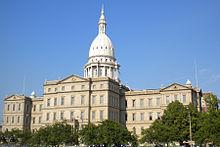
In 1859, the settlement having grown to nearly 3,000 and encompassing about 7 square miles (18 km2) in area was incorporated as a city. The boundaries of the original city were Douglas Avenue to the north, Wood and Regent Streets to the east, Mount Hope Avenue to the south, and Jenison Avenue to the west. These boundaries would remain unchanged until 1916. Lansing began to grow steadily over the next two decades with the completion of the railroads through the city, a plank road, and the completion of the current capitol building in 1878.
Most of what is known as Lansing today is the direct result of the city becoming an industrial powerhouse which began with the founding of Olds Motor Vehicle Company in August 1897. The company went through many changes, including a buyout, between its founding to 1905 when founder Ransom E. Olds started his new company REO Motor Car Company, which would last in Lansing for another 70 years. Olds would be joined by the less successful Clarkmobile around 1903. Over the next decades, the city would see itself transformed into a major American industrial center for the manufacturing of automobiles and automobile parts among other industries. The city continued to grow in area too. By 1956, the city had grown to 15 square miles (39 km2), and doubled in size over the next decade to its current size of roughly 33 square miles (85 km2).
Today, the city's economy is now diversified among government service, healthcare, manufacturing, insurance, banking, and education.

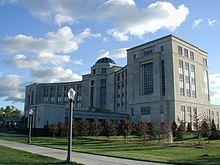
Lansing is the centerpiece of a region of Michigan known as Mid-Michigan or Central Michigan.

According to the United States Census Bureau, the city has a total area of 36.6 square miles (95 km2), of which 36.0 square miles (93 km2) of it is land and 0.6 square miles (1.6 km2) (1.66%) of it is water. This figure includes two 425 Agreements with Alaiedon Township and Meridian Township, and the four 425 Agreements with Delta Township since 2000.
Under Michigan law, 425 Agreements are only temporary land sharing agreements, and do not count as official annexations. The Census Bureau, however, for statistical purposes, does count these as annexations. Not counting the temporary 425 Agreements, Lansing administers 34.1 square miles (88 km2) total.
Lansing is located in the south central part of the lower peninsula where the Grand River meets the Red Cedar River. The city occupies most of what had formerly been part of Lansing Charter Township. It has also annexed adjacent tracts of land in Delta Charter Township and Windsor Township in Eaton County to the west and Delhi Charter Township in Ingham County to the south. The city also controls three non-contiguous tracts of land through 425 Agreements (conditional land transfer agreements) with Meridian Charter Township, Delta Charter Township, and Alaiedon Township in Ingham County to the southeast.
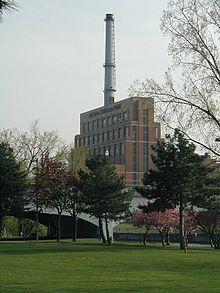
Lansing elevation ranges between 890 feet (271 m) above sea level on the far south side of Lansing along Northrup Street near the Cedar Street intersection, to 833 feet (254 m) to 805.5 feet (246 m) above sea level along the Grand River because of the two dams along the river.
The Grand River, the largest river in Michigan, flows through downtown Lansing; and the Red Cedar River, a tributary of the Grand River, flows through the campus at Michigan State University. There are two lakes in the area, Park Lake and Lake Lansing, both northeast of the city. Lake Lansing is approximately 500 acres (2.0 km2) in size and is a summer favorite for swimmers, boaters, and fishermen. Michigan State University Sailing Club and the Lansing Sailing Club are located on Lake Lansing, where sailing regattas are hosted throughout the summer.
The city of Lansing operates a total of 3.6 square miles (9.3 km2) of parkland, of which 2.8 square miles (7.3 km2) is parkland, 0.5 square miles (1.3 km2) are golflands, and 0.3 square miles (0.78 km2) are cemetery lands. This figure includes the Waverly Hills Golf Course and adjacent Michigan Avenue Park, which are part of Lansing Township, but operated by the City of Lansing. The figure, however, does not include the Ingham County parklands within the borders of Lansing.
Lansing has a typically Midwestern humid continental climate (Koppen Dfb) that is influenced by the Great Lakes. Winters are cold with moderate to heavy snowfall, while summers are very warm and humid. The monthly daily average temperature in July is 70.8 °F (21.6 °C), while the same figure for January is 22.8 °F ( na5.1 °C); the year averages out at 47.5 °F (8.61 °C). On average, temperatures exceed 90 °F (32.2 °C) on 8.8 days of the year and drop below 0 °F ( na17.8 °C) on 10 ae11 nights. Precipitation is generally greatest during summer but still frequent and significant in winter. Snowfall, which normally occurs from November to April, averages 49 inches (124 cm) per season. The highest recorded temperature was 103 °F (39 °C) on July 6, 2012, and the lowest recorded temperature was na37 °F ( na38 °C) on February 2, 1868.
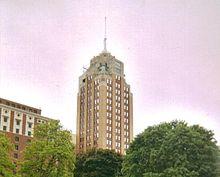
The city's downtown is dominated by state government buildings, especially the State Capitol; but downtown has also experienced recent growth in new restaurants, retail stores and residential developments. Downtown Lansing has a historic city market that is one of the oldest continuously operating farmers' markets in the United States. Upriver and north of downtown is historic Old Town Lansing with many architecturally significant buildings dating to the mid-19th century. Directly south of downtown on the other side of I-496 along Washington Avenue lies "REO Town", the birthplace of the automobile in the United States, is where Ransom Eli Olds built factories along Washington Avenue. Ransom Eli Olds' home, which once overlooked the factories along Washington Avenue, was displaced by I-496.
Lansing is generally divided into four sections: Eastside, Westside, Northwestside, and the Southside. Each section contains a diverse array of neighborhoods. The Eastside, located east of the Grand River and north of the Red Cedar River, is the most ethnically diverse side of Lansing, with foreign-born citizens making up more of its population than any other side in the city. The Eastside's commercial districts are located mainly along Michigan Avenue, and to a lesser extent along Kalamazoo Street. It is anchored by Frandor Shopping Center on the very eastern edge of the eastside.
The Westside, roughly located north, west, and south of the Grand River as it curves through the city, is sometimes regarded the city's most socio-economically diverse section. This side also contains Lansing's downtown area, though this neighborhood is often included as an area all its own. Outside downtown, this side is largely a collection of residential neighborhoods and is served by only one other commercial area along Saginaw Street. However, it also includes a small part of the Old Town Commercial Association.
The Northwestside, generally located north of the Grand River, with the city limits defining its north and western borders, is physically the smallest side of the city. This part of the city includes moderate-density residential areas and some green areas. North of Grand River Avenue, the main street of the side, lie warehouses and light industrial areas served by a major rail line that runs through Lansing. The most notable landmark of this side is Lansing's airport: Capital Region International Airport.
The Southside, usually described as the neighborhoods located south of the Grand and Red Cedar rivers and the I-496 freeway, is physically the largest and most populous side of the city. The area is largely residential in nature (south of Mount Hope Road near the northern edge), and is served by numerous commercial strips along Cedar Street, Martin Luther King, Jr. Boulevard, Pennsylvania Avenue, and Waverly Road, which run north/south. The large Edgewood District is located in the southernmost part of the Southside and is sometimes referred to as South Lansing. Though it is the largest area of the city by both physical size and population, it has often been regarded by Southside citizens as Lansing's most overlooked and forgotten area, as most of Lansing's attention in recent decades has been put into the revitalization of the city's historic core located mostly on small parts of both the East and Westsides.
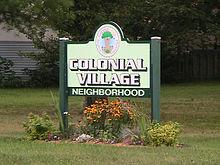
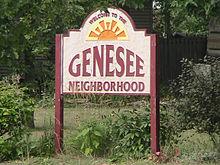
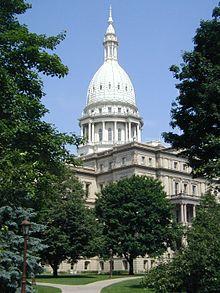
As of the census of 2010, there were 114,297 people, 48,450 households, and 26,234 families residing in the city. The population density was 3,174.9 per square mile (1,226.3/km2). There were 54,181 housing units at an average density of 1,505.0 per square mile (581.3/km2). The racial makeup of the city was 61.2% White, 23.7% African American, 0.8% Native American, 3.7% Asian, 0.04% Pacific Islander, 4.3% from other races, and 6.2% from two or more races. Hispanic or Latino of any race were 12.5% of the population. Non-Hispanic Whites were 55.5% of the population in 2010, compared to 86.4% in 1970. The foreign-born population sat at 8.3%.
As of 2000, the city's population rose by 32,293 (27%) to 151,421 during the day because of the influx of workers.
As of 2000, there were 49,505 households out of which 30.0% had children under the age of 18 living with them, 35.8% were married couples living together, 17.0% had a female householder with no husband present, and 42.7% were non-families. 33.2% of all households were made up of individuals and 8.1% had someone living alone who was 65 years of age or older. The average household size was 2.39 and the average family size was 3.08.
In the city the age distribution of the population shows 26.8% under the age of 18, 11.4% from 18 to 24, 32.7% from 25 to 44, 19.3% from 45 to 64, and 9.7% who were 65 years of age or older. The median age was 31 years. For every 100 females there were 92.3 males. For every 100 females age 18 and over, there were 87.9 males.
The median income for a household in the city was $34,833, and the median income for a family was $41,283. Males had a median income of $32,648 versus $27,051 for females. The per capita income for the city was $17,924. About 13.2% of families and 16.9% of the population were below the poverty line, including 23.2% of those under age 18 and 9.0% of those age 65 or over.
Lansing is administered under a mayor-council government, more specifically a "strong mayor" setup in which the mayor holds most of the city's administrative powers, such as appointment of department heads and drafting and administering a city budget, though the council must approve his/her actions. The mayor is elected at-large every four years. The city clerk is also elected every four years. The city council consists of eight members, and includes four members elected from the city's four wards, as well as four "at-large" members elected citywide.
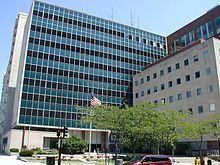
The city finds itself wedged between the conservative politics of West Michigan, and the more liberal politics of Southeastern Michigan. The city has not had a Republican mayor in office for more than a decade, and the last two mayoral elections have hosted all Democratic candidates.
Lansing currently lies mostly within the boundaries of Michigan's 8th congressional district, which has been represented by Republican congressman Mike Rogers since 2001. The small portion of the city that extends into Eaton County is located in Michigan's 7th congressional district, which has been represented by Republican congressman Tim Walberg since 2011.
At the state level, Lansing is located in the 23rd district of the Michigan Senate, which has been represented by Democratic state senator Gretchen Whitmer since January 1, 2007. The small portion of the city that extends into Eaton County is located in the 24th district of the Michigan Senate, which is currently represented by Republican state senator Rick Jones. The city lies in the 67th, 68th, and 71st districts of the Michigan State House of Representatives, represented by state representatives Barb Byrum (D-67), Joan Bauer (D-68), and Deb Shaughnessy (R) (R-71).
Despite Lansing not being a designated county seat, many county offices and courts are still located within downtown Lansing, including the Ingham County Department of Human Services and the county circuit court.
The Lansing metropolitan area's major industries are government, education, insurance, healthcare, and automobile manufacturing. Being the state capital, many state government workers reside in the area.
Michigan State University, Thomas M. Cooley Law School, and Lansing Community College are significant employers in the region.
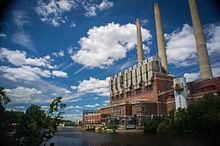
General Motors has offices and a hi-tech manufacturing facility in Lansing and several manufacturing facilities immediately outside the city, as well, in nearby Lansing and Delta townships. The Lansing area is headquarters to four major national insurance companies: Auto-Owners Insurance Company, Jackson National Life, the Accident Fund, and Michigan Millers Insurance Company. Other insurers based in Lansing include Farm Bureau Insurance of Michigan.
Locally owned and operated convenience store chain Quality Dairy is a significant presence in the Lansing market.
The recent decline of the auto industry in the region has increased the region's awareness of the importance of a strategy to foster the high-technology sector.
Early availability of high-speed Internet in 1996, as well as the MSU, Cooley Law School, and Lansing Community College student body population, fostered an intellectual environment for information technology companies to incubate. Lansing has a number of technology companies in the fields of information technology and biotechnology.
Sparrow Hospital is a 740-bed hospital and is affiliated with Michigan State University and its College of Human Medicine and College of Osteopathic Medicine. In February 2009 it was announced that Sparrow and MSU formalized their partnership to increase research and faculty recruitment. Sparrow Hospital is the Regional Center for pediatrics, cancer care, including radiation therapy, trauma care, neurological care, high-risk obstetrics and neonatal intensive care. The Sparrow Tower was finished January 2008 and includes but is not limited to: a dedicated pediatric emergency room (the only one in the region), the largest adult emergency room in the region, state-of-the-art operating rooms, a rooftop helipad, oncology center, heart and vascular center and orthopedic department. In addition, 4,500 deliveries are performed at Sparrow Hospital annually, rehabilitation, and emergency treatment is more than any other hospital in mid-Michigan. The Sparrow Health System Laboratory performs over 3 million tests per year, at various laboratory sites, which include four remote testing facilities and thirteen patient service centers. Sparrow Hospital is certified as a Level I Trauma Center by the American College of Surgeons. In May 2009 Sparrow announced that it now has its own helicopter service based at its downtown Lansing hospital's new $2.5 million helipad. The addition is expected to increase helicopter patient transport to the hospital from four a month to 400 a year.
McLaren aeGreater Lansing Hospital is also a university affiliated teaching hospital. Ingham enjoys a special affiliation in radiation oncology with the University of Michigan and Michigan State University; McLaren aeGreater Lansing is part of the Great Lakes Cancer Institute (GLCI). McLaren received five-star ratings for: Coronary bypass surgery; Cardiac interventions; Treatment of heart attacks; Total knee replacement; Total hip replacement; Back and neck surgery; Chronic obstructive pulmonary disease care; Community-Acquired pneumonia care.
Several urban renewal projects by private developers are adding higher end apartments and condominiums to the Lansing market. The Arbaugh, a former department store across from Cooley Law School, was converted into apartments in 2005. Motor Wheel Lofts, a former industrial site, was converted into loft-style living spaces in mid-2006. A combination retail and residential complex immediately south of Cooley Law School Stadium (formerly Oldsmobile Park) called "The Stadium District", was completed in 2007. The Stadium District, was redeveloped using a grant from the Cool Cities Initiative. In May 2006 the historically significant Mutual Building located on Capitol Avenue was purchased by The Christman Company to be renovated back to its original grandeur and used as the company's headquarters. Additional downtown developments include the renovation of the historic Hollister Building, and the expansion of the former Abrams Aerial Building. As of August 2008, an 18-story condominium high-rise called Capitol Club Tower is in the design phase with the adjacent parking structure already having been approved by city council and purchased by the developer. The city market, in existence since 1909, was approved to be sold for a multi-building mixed-use development called MarketPlace, right next to the current market on the adjacent riverfront. The MarketPlace project was redeveloped along with BallPark North, another mixed-use development that will be immediately north of Oldsmobile Stadium. The new city market will be across the river from where the Accident Fund Insurance Company is renovating the former (art deco) Ottawa Street Powerplant into their new headquarters, as well as the addition of modern buildings to the north that will be connected by an atrium. In 2009, the restaurant Troppo began construction on a new 2-story building that will have an open air patio on the roof facing the Capitol building. Developer Eyde Co. announced plans on April 6, 2010, to renovate the historical and prominent Knapp's building in downtown Lansing for first floor retail, office space and apartments/condos on the top floor (5th) in a $22 ae24 million project.
According to Lansing's 2011 Comprehensive Annual Financial Report, the top employers in the Lansing region are:
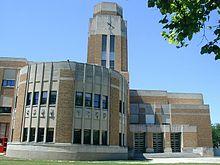
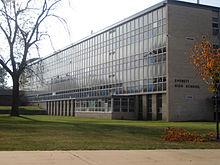
Michigan State University, a member of the Big Ten Conference, is known as "the pioneer land grant college", located in neighboring East Lansing. MSU has the largest land campus in the United States and is home to several nationally and internationally recognized academic and research oriented programs. Michigan State offers over 200 programs of study and is home to fourteen different degree-granting schools and colleges including three medical schools, a law school, and numerous PhD programs. It is the only university in the nation with three medical schools. MSU is consistently one of the top three programs in the United States for study abroad programs. The MSU College of Education is also consistently rated as the top education program in the nation. Michigan State University is the oldest agricultural college in the United States. The MSU School of Criminal Justice is the oldest continuous degree granting criminal justice program in the nation. In 2008, the Department of Energy announced MSU won the contest for a $550 million Facility for Rare Isotope Beams that will attract top researchers from around the world to conduct experiments in nuclear science, astrophysics and applications of isotopes to other fields.
The Thomas M. Cooley Law School is the largest law school in the nation and is located in downtown Lansing. Cooley is fully accredited by the American Bar Association. A majority of Cooley students are from out-of-state.
Lansing Community College offers more than 500 areas of study to over 18,000 students at its main facilities in Lansing, and another 5,000 students at twenty-nine extension centers and a site in Otsu, Japan. LCC's new, state-of-the-art University Center enables students to take courses with the goal of eventually earning an undergraduate or graduate degree from other Michigan institutions. The University Center stands on the former site of "Old Central", Lansing's first public high school, which was established in 1875 as Lansing High School. (In the 1920s it was renamed as Central High School, and in 1957 became the first building on the LCC campus.)
Other institutions of higher education include Western Michigan University (branch campus in Delta Township), Davenport University in Downtown Lansing, Central Michigan University (branch campus), and Great Lakes Christian College (campus in Delta Township).
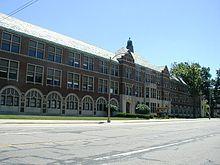
The film Tape is set in a hotel room in Lansing.
The film Tooth Fairy's main character Derek Thompson (Dwayne Johnson) is a minor league hockey player for the fictitious Lansing Ice Wolves.
Lansing is home to a number of small, specialized museums such as:

Lansing has several farmers' markets throughout the city in the summer months. These markets include the Allen Street Farmer's Market on the city's eastside, the Westside Farmers' Market, the Old Town Farmer's Market, the South Lansing Farmer's Market, and the year-round historic Lansing City Market located near downtown. The Lansing City Market has built a brand new $1.6 million facility on the riverfront in downtown Lansing where it will continue its year round operations providing specialty items in addition to regular groceries from over 30 vendors.
The historic Potter Park Zoo, located along the Red Cedar River in Lansing, has more than 500 animals and numerous programs and events for children and families. With annual attendance increasing every year since 2006 (167,000 in 2009, compared to 137,236 in 2008 and 110,167 in 2006) there are $667,100 in capital improvements planned for 2009 including a giant walk-in aviary and a new female tiger. In 2009 the zoo began a $1.4 million renovation to its rhinoceros exhibit. This is in addition to $1.3 million spent on capital improvements in 2008.
The Library of Michigan and Historical Center is a highly regarded state library and research center. The library is one of the top five genealogical research facilities in the United States. The Capital Area District Library has 13 branches within Ingham County, some of these include: The Main library downtown, the Foster Library on the east side, and the South Lansing Library on the south side.
Lansing's oldest art gallery, founded in 1965, Lansing Art Gallery is a non-profit membership organization. Showcasing the works of Michigan artists, Lansing Art Gallery is committed to providing cultural enhancement opportunities for Michigan residents. Open to the public. Free admission.
In October 2009 the Wharton Center for Performing Arts completed a 24,000 sq/ft, $18.5 million expansion and renovation, having already spent over $1.3 million in 2008. Many Broadway shows come to The Wharton Center before traveling to theaters in larger places such as Chicago. The Kresge Art Museum, the MSU Museum, and the Abrams Planetarium are highly acclaimed cultural destinations located on the campus of Michigan State University in East Lansing. In June 2007 MSU announced the plans to build a new art museum after a $26 million gift from Eli and Edythe Broad. Internationally known Pritzker Prize winning architect Zaha Hadid of London won the design competition for the museum that will be built in East Lansing.
Cable slots listed reflect the Comcast cable system in Lansing.
WILX maintains WSYM's News programming. Both affiliates broadcast their newscasts at the News 10 studios in Lansing. Often the same reporters are used on both broadcasts.
Lansing's radio dial has quite a few stations. Note: If the station has no city listed before the format, it is licensed to Lansing.
Radio stations from Ann Arbor, Grand Rapids, Kalamazoo, Saginaw, and Flint can also be heard in the Lansing area.
The Lansing Lugnuts are a Class A Midwest League, Minor League Baseball team, currently affiliated with the Toronto Blue Jays. The team plays its home games at Cooley Law School Stadium, which was built at a cost of $12.7 million and opened in 1996 in downtown Lansing. It was partially renovated in 2006. Cooley Law School Stadium has a seating capacity of 11,215 fans, and was built to accommodate additional expansion. The team has won two Midwest League championships, their first in 1997 and their second in 2003. Previously known as Oldsmobile Park, the facility was renamed Thomas M. Cooley Law School Stadium in April 2010, in reference to the park's new sponsor.[102]
The Summit at the Capital Centre is a hockey arena and convention center located in the suburb of Dimondale that hosts youth and high school hockey.
The Lansing Capitals began play in the International Basketball League in 2006.
Michigan State University sponsors both men's and women's sports, usually competing as a member of the Big Ten Conference. The Spartans have won National Titles in Men's Basketball, Football, Men's Boxing, Men's Cross Country, Men's Gymnastics, Men's Ice Hockey, Men's Soccer, and Men's Wrestling.
On November 27, 2011 MSU beat Northwestern in their Big Ten Football finale to secure the top Big Ten record at 7-1 in conference play, and set up their entrance to the first Big Ten Football Championship Game to be held December 3, 2011 at Lucas Stadium in Indianapolis, Indiana against the Wisconsin Badgers.[103]
Lansing Community College also sponsors many sports, competing as members of the Michigan Community College Athletic Association. The Stars have won NJCAA titles in the following sports: Women's Softball, Men's Basketball, Women's Basketball, Men's Cross Country, Women's Cross Country, Women's Marathon and Men's Marathon.
The Lansing area is also known for its many golf courses, with two courses owned by Michigan State University, four municipal courses, and many additional public and private courses in the area. Walnut Hills Country Club in nearby East Lansing formerly hosted the LPGA's Oldsmobile Classic from 1992 to 2000. The Michigan PGA recently relocated from the Detroit area to Bath, Michigan, which is on the northern edge of Lansing.
In the 1980s and 1990s Lansing was a major player in semi-pro football. The Lansing Crusaders won MFL/MCFL championships in 1982, 1983, 1985, 1987, 1989, and 1990. The team finished second in 1984, 1986, and 1991.
Other past sports teams include:
Scheduled commercial airline service is offered from Capital Region International Airport (formerly known as Capital City Airport).[104] Delta Air Lines maintains routes to Detroit and Minneapolis/St. Paul. United Airlines maintains routes to Chicago O'Hare. Allegiant Air flies to Orlando, Florida. Sun Country Airlines and Apple Vacations offer non-stop flights to Washington, D.C. and Minneapolis/St. Paul,[105] and seasonal flights to Orlando; CancRºn, Mexico; Puerto Vallarta, Mexico; and Punta Cana, Dominican Republic.[106] UPS has a freight hub at Capital Region International Airport making up part of the 42 million pounds of annual cargo moving through the airport.[107] In 2008 the airport received a port of entry designation ae known as Port Lansing ae and now has a permanent customs facility, thus changing its name to reflect the port of entry status.[108] The same year a 500-foot (150 m) extension to the largest of the three runways ae now 8,506-foot (2,593 m) ae was completed to allow for larger aircraft to use the airport.[109]
The Michigan Flyer provides bus service between Lansing and Detroit Metro Airport eight times daily.
Water supply, power and steam are municipally owned utilities which are provided by Lansing Board of Water & Light. In 2008 the Lansing BWL constructed Michigan's largest solar array towards the goal of increasing renewable energy in the energy grid.[112]
Natural gas is provided by Consumers Energy.
Lansing has six sister cities, as designated by Sister Cities International:
Lansing has three "friendship cities":[115]
Word Count: 5941







